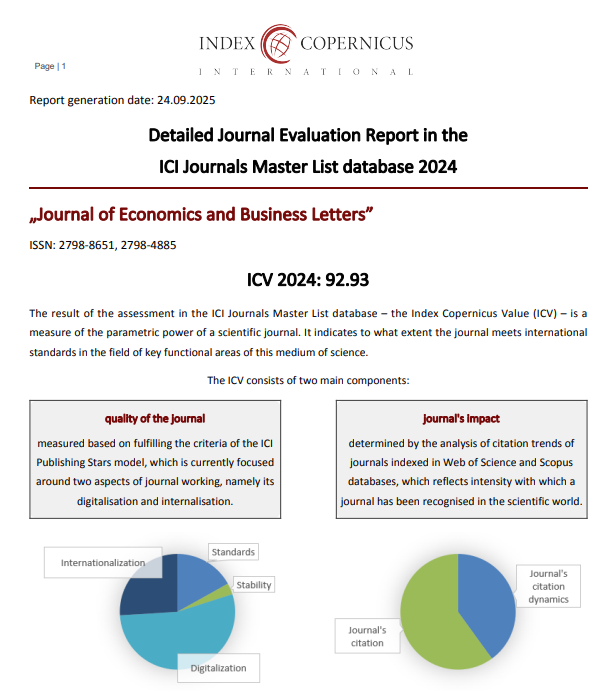
ADDITIONAL MENU
JOURNAL TEMPLATE
BECOME REVIEWER
Indexed by
TOOLS
INFORMATION
VISITORS
The Journal of Economics and Business Letters (JEBL) is an international, peer-reviewed academic journal committed to advancing global scholarly discourse in the fields of economics, business, finance, and management. JEBL publishes original, high-quality contributions that enrich theoretical understanding, deliver robust empirical evidence, and provide critical perspectives on contemporary issues affecting organizations, markets, and societies worldwide.
We particularly value innovative and rigorous research that addresses global or cross-national phenomena, fosters international comparisons, or offers insights applicable across diverse cultural and institutional contexts. Interdisciplinary works that bridge theory and practice, or integrate perspectives from related disciplines, are especially welcome.
In line with its international orientation, JEBL encourages contributions that engage with pressing global challenges—such as economic development, sustainability, digital transformation, financial inclusion, and corporate governance—relevant to scholars, practitioners, and policymakers around the world.
The journal welcomes submissions employing quantitative, qualitative, or mixed methodologies and encourages methodological innovation that advances research frontiers. To foster meaningful scholarly dialogue, JEBL also accepts theory-focused contributions, comprehensive literature reviews, methodological papers, conceptual frameworks, case studies with significant academic relevance, and critical book reviews.
All submissions undergo a rigorous double-blind peer-review process to ensure academic integrity, originality, and relevance to the journal’s international readership.
JEBL invites submissions in, but not limited to, the following internationally-relevant areas:
Microeconomics and Macroeconomics in a global context
International Economics, Trade, and Global Value Chains
Development Economics and Emerging Markets
Corporate Finance, Investment, and Financial Systems
Banking, FinTech, and International Financial Markets
Business Strategy and Strategic Management in Multinational Firms
Marketing Management and Cross-Cultural Consumer Behavior
E-Business, Digital Platforms, and Global Commerce
Operations Management, Production Systems, and Global Supply Chains
Total Quality Management (TQM), Six Sigma, and Lean Management
Knowledge Management and Organizational Learning in International Firms
Entrepreneurship, Innovation, and Technology Management
Human Resource Management, Diversity, and Organizational Behavior
Leadership Studies and Change Management in Global Organizations
Accounting, Auditing, and International Financial Reporting Standards
Business Ethics, Corporate Governance, and Sustainability in Global Contexts
Information Systems, Business Intelligence, and Analytics
Public Policy, Regulatory Economics, and Global Institutions
Behavioral Economics and Behavioral Finance across Cultures
By encouraging scholarship that transcends national boundaries, JEBL seeks to provide a platform for critical debate and exchange of ideas that advance the frontiers of research and practice globally.

ADDITIONAL MENU
JOURNAL TEMPLATE
BECOME REVIEWER
Indexed by
TOOLS
INFORMATION
VISITORS
Publisher: PRIVIETLAB

Journal of Economics and Business Letters is licensed under a Creative Commons Attribution 4.0 International License.
